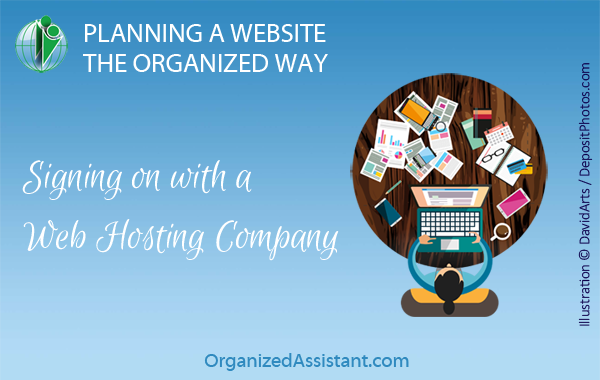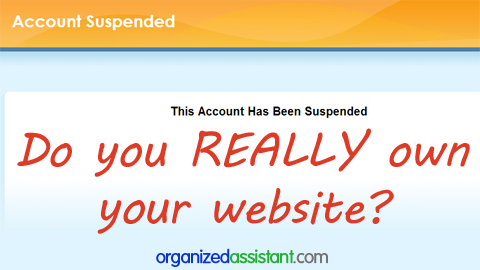Signing on with a Web Hosting Company
This page may contain links to Amazon.com or other sites from which I may receive commission on purchases you make after clicking on such links. Read my full Disclosure Policy

This week we’re going to take a break from planning your website’s message and design, to focus on some important technical issues.
Just as files are stored on your personal computer, every website must be stored on a computer on the Internet. You need to purchase this service from a hosting company – think of it as renting a home for your website. Hosting can range from free to hundreds of dollars per month, so it’s important to make an informed decision.
There are five basic types of web hosting. Which one is right for you?
Free Hosting
As the saying goes, “There’s no such thing as a free lunch,” so remember that if you opt for free hosting.
The company supplying the hosting is not doing it out of the goodness of their hearts, so if you, the customer, are not paying for it, the costs are usually covered by allowing advertisers to place ads on your site. Even if you’re comfortable having ads on your site, visitors to your website may assume that you endorse the products or services being promoted, even though you have no control over the content of these ads.
Shared Hosting
Most solo entrepreneurs with a basic website can get by with an inexpensive shared hosting account.
Shared hosting is usually under $10.00 a month, even less if you pay for a full year or multiple years in advance. If price is the most important factor, shared hosting is the way to go. It’s so inexpensive because you share a server with a few hundred (or several thousand) other small sites.
The trouble with shared hosting is that some service providers, in an effort to increase their profits, try to host too many sites on the same server. As a result, your pages may be very slow to load, and visitors might not bother to stick around. Slow load times can also have a negative effect on your search engine ranking. Furthermore, it’s frustrating to have to wait for pages to refresh when you’re working on a blog post or other update to your website!
In addition, you have no way of knowing who you’re sharing that hosting space with, and there’s a risk that your site may be flagged as a security risk due to the activities of other users.
Virtual Private Server
A Virtual Private Server, or VPS, is also a type of shared server, but you only share it with a few other sites, rather than hundreds. It can therefore handle higher loads of traffic, and you have more server resources and more control.
Of course, you’ll pay a bit more, probably between $20.00 and $100 per month. A VPS can handle significant traffic, but if you or one of your neighbors experiences a sudden increase in traffic, the server may run out of processing power, and your site’s performance will drop.
With a VPS, you’re responsible for your own security measures, so it’s not recommended unless you’re really tech savvy. If your site gets hacked or goes down, the support desk won’t be able to offer much assistance if you haven’t been backing up your site regularly.
VPS hosting is available through many reputable web hosting services.
Dedicated Server
Dedicated servers give you a whole server, or even several, to work with. For that reason, they’re even more expensive than a VPS.
Dedicating hosting gives you absolute control over all the technical aspects of hosting your sites, so you’ll need to have access to a highly trained tech person who knows their way around a MySQL database and how to maintain your security protocol and firewall. This is probably a lot more power than you need for your small business website.
Managed Hosting
Most web hosts can handle WordPress, some better than others. But if you want the best hosting solution for your WordPress site, it’s worth looking into hosting designed specifically for WordPress sites. This elite breed of hosting is the top of the line for speed and scalability. In addition, the hosting company automatically updates WordPress when the latest version is released – one less thing for you to worry about!
I’ve been using Managed Hosting services for many years and I love it so much that I now use it for all of my own sites, and now offer it to my Website Care Plan clients too. Not only does my site run faster, it’s reassuring to know that the site can handle the traffic and that backups and security are being looked after.
Managed hosting costs more than shared hosting, but if you can afford it, you certainly get what you pay for.
Have you dealt with a great hosting company, or a really bad one? Please share your experience in the comments!




Wow, pretty interesting. I started using BlueHost back in the day and haven’t really had any problems that I’m aware of. What are you thoughts on this one?
My understanding is that HostGator and BlueHost are owned by the same company, but I haven’t heard any negative feedback about BlueHost or had any problems with the client sites that are hosted there. If you’re happy with it, I wouldn’t worry about it, though a security expert recommended we should always have an alternate web host in mind in case something goes terribly wrong and we need to move in a hurry.
Great information Janet! Having a shared server through a hosting company can be risky. Not all hosting companies are forthcoming with information. I like to contact them directly by making a phone call, whenever there is an issue. My hosting company is pretty good about helping me figure out the issue. If they can’t do anything about it, they can at least give me some ideas on where to go to find out more information. Some hosting companies don’t have a great customer service. Asking the question to them over the phone before signing up, “what is the process if I want to change hosting companies?” is so important. And, shop around. I have several clients that found out after the fact, that their hosting company was charging them other services that they didn’t need. When they finally spoke with them directly, they were able to reduce their costs significantly. Thanks for sharing.
And thank you for all that added insight – very helpful!
I use 1&1 and I have not had any trouble, they are very affordable as well.
Good to hear, Jill! One of my clients had a problem with them recently where her package no longer handle the demands of her site, and it took a few days to get it upgraded. That’s always something to watch out for too, no matter who you host with.
I, too, use 1&1, which I believe is a VPS. I just recently ran into a memory capacity issue which led to upgrading my package (now $15/mo for all the bells and whistles they offer). What I like best about them is their customer service, not that I have to use it very often.
Customer service is so important! I like dealing with companies that have a ticketing system so you can follow the progress of your request, but can also be reached by phone or live chat when it’s an urgent matter.
Thanks for the resources, Janet. I’m working with two other professionals on a joint venture and we’re at the point of talking about a website so this couldn’t have come at a better time!
Oh yay! I hope the rest of this series has been helpful too.
Really great information Janet! I’m really liking the WP Engine. I have Go Daddy for my organizing website and I think it’s fine because it’s a static website. I’m also glad you are there to take care of my hosting issues for me! So thank you! 🙂
Good point – you can definitely get away with cheaper hosting with a smaller site, especially one that is static. WordPress itself isn’t too demanding, but once you add a lot of plugins and large images, things can get a bit tricky. I’m glad you’re happy with WP Engine.